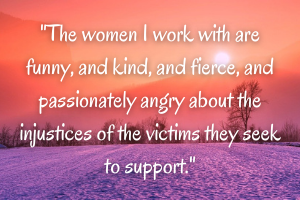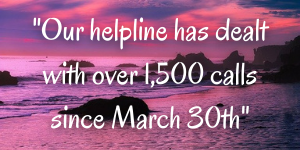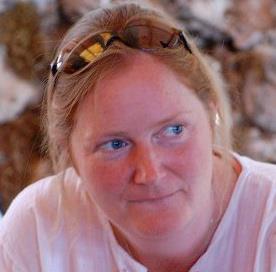The last time I wrote a blog was in March, it’s now November and the months have flown past in a busy haze, we are a week or so into the second lockdown and as the first lockdown saw 16 women murdered by men in the first 3 weeks, we are desperately worried about what this means for the many victims and survivors isolated by perpetrators. It’s Saturday morning and I am sat at my desk at home, the light is dull and the rain is relentless, I would usually be watching my daughter’s football match, but lockdown has stopped those too, so I have unplanned time on my hands. I am avoiding working on my thesis (understandable), so I thought I would indulge myself a little and allow myself a moment to reflect the last few months on the frontline in the male violence against women sector.

Every week either myself, the Community project manager (Lyn) or Operations manager (Zoe), take it in turns to provide the on call management for the staff who are womaning the phones on our 24/7 domestic abuse helpline (our main service response to the COVID19 pandemic). Being on call to them is both a privilege and a pleasure, I love chatting to the staff and one of the greatest things about the pandemic is that it has allowed me to do this much more often. The women I work with are funny, and kind, and fierce, and passionately angry about the injustices of the victims they seek to support. Bookending my day with a call in the morning to them and a call at night (with intermittent calls about survivors needs over the 24/7 period) has led me back to where I belong.
My job title for the last 9 years has been CEO, for a small charity it is a role that requires flexibility and I just approach it as a roll your sleeves up and get stuck in kind of job… but my heart is never too far away from the frontline. It is easy to drift away from frontline provision when you work in senior management, especially when you have the awesome team of staff that I do, but my passion still lies in the real work. It’s the simple stuff that makes me tick, the phone calls late at night the messages I get on social media of women asking for help, the calls with my colleagues about cases they are working on, the angry rants between us as team members about survivors being systematically let down or not believed. I love to approach our work with a sense of tenacious defiance and that keeps me going.
Do I get tired? Yes of course, we all do. Working in the male violence against women sector feels like a relentless marathon sometimes and it is exhausting (Shout out to all the other sisters in the sector working all hours!). But it isn’t the victims and survivors who exhaust me. Quite the contrary, speaking to them or supporting the staff to support them is the antithesis of exhaustion it relights the fire in my belly every time I have the privilege to do it.

Apart from the endless funding bids I write, the exhaustion for me is the feeling that women are still not being heard. Although a great deal of strides have been made to improve things, as a sex class, we as women* still face the global reality of male violence against us. Having had the honour of working in this movement for a long time, I have listened and born witness to hundreds of singular stories from women about the torture that men have subjected their bodies and minds to. Each story makes up a collective narrative of the reality of male violence and the abuse against them is not abating (our helpline has dealt with over 1,500 calls since March 30th).
Opening our services 24/7 was a risky idea, both financially and resource wise, but it has worked and we will continue for as long as we can. For me it paid off in a personal way that cannot be quantified financially. It reminded me of my roots, of where I started, and of the simplicity of provision that survivors want and need. It really is as basic as an empathetic voice, a listening ear and the beginning of empowering survivors to start to believe that they can trust us. Most importantly, as with all specialist service provision, it is the starting point of being the voice in opposition to the perpetrators narrative.
Our helpline is not part of our usual service provision outside of COVID19 and usual service will resume after the pandemic. But the experience has offered me, as the CEO, the opportunity to reflect on the simplicity of accessibility that survivors want and need.
The last six months reminds me I need to work hard to ensure the access points for all survivors should never be complicated. Of course all charities like Aurora are bound by resources and we can only work to levels we are funded for, which means for some services we only have one advocate, for a vast area. That means in order to offer a safe service for our existing clients we sometimes have to close our books on our referral pathways, we always do this with a heavy heart, but until I win the lottery or services like ours are funded in full response to capacity needs, it is a reality we have to work with.
But we can learn from our helpline provision, which is never closed! The service has evidenced that 44% of victims and survivors called the helpline for information and advice only, they didn’t want or, at that time, need an onward referral for a case working service. To that end, and in keeping with our ethos of victims and survivors as our central priority, I am going to work on dedicating a page on our website for simple guidance and advice for all service provision. On a selfish level it means I get the excuse to keep the connection with the women* I care so deeply about.
I want to apologise to the survivors Aurora was set up to serve, that I didn’t think to do this sooner. I guess sometimes it takes a crisis to remind us what the basic simple things are and then use it as a catalyst to reflect and build back up from there.
It might take me a few months past the pandemic to do this but I pledge to make it happen, although right now, I really should stop avoiding my bloody thesis…
Shonagh Dillon
CEO – Aurora New Dawn
If you are in Hampshire our domestic abuse helpline is open 24/7 – call us on 02394 216 816 #WeBelieveYou.
You can help Aurora raise vital funds during the COVID19 pandemic:
* Rather than waste my time answering the trolls on social media, I thought it best to write an addendum to this post:
In anticipation of the ‘what about the men’ questions – all our one to one services are open to men, including the helpline. I do not deny that men can be victims too and when they access our services, we treat them with empathy, care and respect they all deserve. But as is statistically evidenced men don’t experience intimate partner violence to the same levels that women do. That doesn’t mean I don’t think they don’t deserve services it just means there aren’t as many of them which is why I centre women in my work.
My career has been informed by feminist practice and it is on that basis that I will not appease men’s rights activists by denying the material reality of male violence and the oppression of women as a sex class. If you disagree with my stance, I can only apologise that you had to get to the end of this blog to find that out.
Next step…
Do you want to get in touch with us?
Want to help us raise awareness?
Want to donate to our cause? 💜

